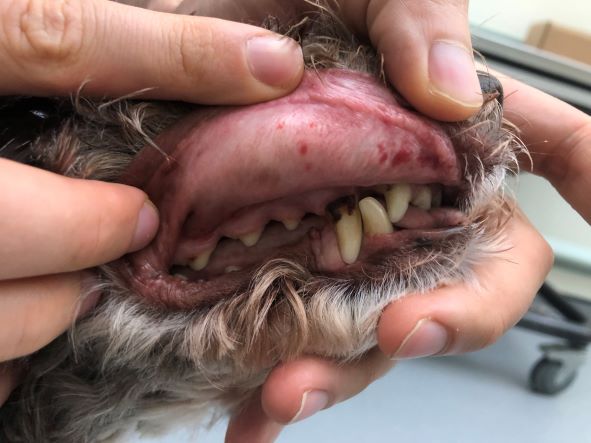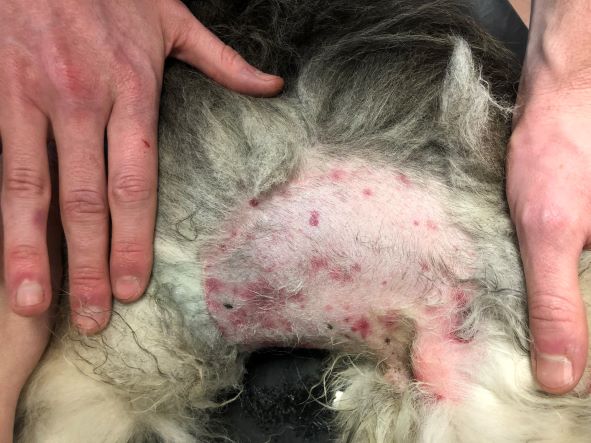The RVC calls for dogs with autoimmune diseases to take part in observational study to improve canine wellbeing
Researchers at the Royal Veterinary College (RVC) are inviting pet owners with dogs who have a newly diagnosed autoimmune disease to take part in an observational study to better understand the prognosis and help improve the wellbeing of those diagnosed in the future.

The practitioner researchers, led by Dr Barbara Glanemann and Dr James Swann at the RVC, have created an observational registry to collect information about dogs who have recently been diagnosed with an autoimmune disease. The ‘ImmunoRegistry’ data will be collected in real time over a year after their diagnosis to find out how they respond to treatment.
Autoimmune diseases, where the body attacks its own cells, can lead to severe illness that requires intensive veterinary care and carefully adjusted, prolonged treatments. Common conditions in dogs include immune-mediated haemolytic anaemia (IMHA, where the body attacks its own red blood cells); immune thrombocytopenia (ITP, where the body attacks platelets important to stopping bleeding); immune-mediated polyarthritis (IMPA, affecting several joints); and steroid-responsive meningitis arteritis (SRMA, resulting often in severe neck pain and fever).
In some dogs, the necessary treatment can cause side effects that negatively impact their quality of life. Almost all research into autoimmune diseases in dogs has been conducted in large specialist veterinary hospitals, but many dogs are diagnosed and treated in local first opinion veterinary practices, meaning that current information may not reflect real world trends.
To address this, the observational registry will collect data on dogs diagnosed in both local practices and specialist hospitals. With this information, the team will then examine the prognosis associated with the diseases, if there are risks of relapse and whether medication works better in certain breeds of dog.
The RVC is looking for dogs who have been diagnosed with IMHA, ITP, IMPA or SRMA. In order to meet the criteria, pet owners should:

- Be UK based
- Register their interest and consent to participate in the study within 14 days of their dog receiving a diagnosis of one of the above conditions
- Be willing to fill out six, five-minute surveys on the quality of life of their dog over a period of 12 months following diagnosis.
Dr Barbara Glanemann, Senior Lecturer in Small Animal Medicine and Head of the Small Animal Internal Medicine Service at the RVC said:
“We are looking to observe as many dogs as possible so that we can examine the data and ultimately share more informed advice and guidance with vets, and in turn, owners.
“This ambitious project relies on the enthusiasm and support of dog owners, and we look forward to using our results to improve the wellbeing of any dog diagnosed with immune-mediated disease in the future.”
Participating in the study will not alter the treatment or management of any dog – the animal’s own vet will still be in charge of treating the dog, and the RVC will only collect information about how this is going. All personal data will be treated confidentially and securely, and dog owners can choose for their pet to opt out at any time, and this will not affect the care of the dog.
If your dog has recently been diagnosed with one of the above immune-mediated diseases, you can register your interest via rvc.onlinesurveys.ac.uk/immunoregistry and the team will be in contact via email.
Notes to Editors
For media enquiries, please contact:
- jasmin.devivo@plmr.co.uk or rvc@plmr.co.uk
- Press Line: 0800 368 9520
About the RVC
- The Royal Veterinary College (RVC) is the UK's largest and longest established independent veterinary school and is a Member Institution of the University of London.
- It is one of the few veterinary schools in the world that hold accreditations from the RCVS in the UK (with reciprocal recognition from the AVBC for Australasia, the VCI for Ireland and the SAVC for South Africa), the EAEVE in the EU, and the AVMA in the USA and Canada.
- The RVC is ranked as the top veterinary school in the world in the QS World University Rankings by subject, 2022.
- The RVC offers undergraduate and postgraduate programmes in veterinary medicine, veterinary nursing and biological sciences.
- The RVC is a research led institution with 88% of its research rated as internationally excellent or world class in the Research Excellence Framework 2021.
- The RVC provides animal owners and the veterinary profession with access to expert veterinary care and advice through its teaching hospitals and first opinion practices in London and Hertfordshire.
You may also be interested in:
-
RVC Students Among Top Three in BSAVA Research Project Competition
Two RVC students were placed in the top three in the BSAVA’s Companion Student Research Project …

